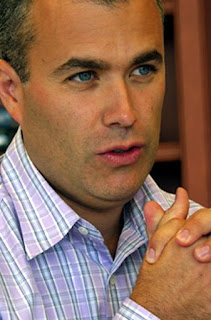WASHINGTON, D.C. – U.S. Senate Republican Whip Jon Kyl delivered remarks Wednesday on the Senate floor regarding the President’s first 100 days in office. The following are his prepared remarks:
“President Obama’s first 100 days in office make for compelling news stories, but what we should really focus on is what lies ahead in the next 100 days, next year, in the next four years, and beyond.
“This has been an expensive 100 days for the American people. Since his inauguration, President Obama has signed into law $1.19 trillion in new spending. That’s $11.9 billion of spending for each day he has been in office.
“And those figures don’t include his $3.7 trillion budget for next year, a measure now awaiting final action. The Congressional Budget Office estimates that if this budget is passed and signed into law by President Obama, by 2019, public debt will reach 82.4 percent of GDP. That means more new debt will be created under this one budget than all of the combined debt created by the previous 43 presidents – back to George Washington.
“I believe President Obama’s budget will put us on an unsustainable course. It proposes a sweeping change of course for the U.S. economy that will shift the balance of power away from the private sector toward the federal government.
“It’s not just the uncharted levels of spending and debt; this budget levies higher taxes on every household in the form of a national energy tax and puts taxpayers on the hook to pay for a larger and more intrusive federal government. In other words, this budget spends too much, taxes too much, and borrows too much.
“President Obama has made his proposed new spending sound more palatable by describing it all as an ‘investment’ that will pay off by saving us money down the road. Most of the new spending, however, is for services and programs whose long-term value continues to be debated by senators, economists, and the public alike.
“Nor is there any intention of cutting spending on a future date. This budget does not propose one-time investments followed by years of reduced spending. Instead, billions in new outlays will continue indefinitely – meaning the permanent accruement of power in Washington. Rolling back the federal government’s reach in the coming years could prove a Sisyphean challenge.
“Those of us in Washington need to keep in mind that families and small businesses, now more than ever, make sacrifices and tradeoffs in their own budgets. Shouldn’t we do the same? This budget continues business as usual, making no hard choices about how to reign in out-of-control government spending. The budget is so big that, according to Heritage Foundation estimates, a quarter of a million new federal bureaucrats may be required just to spend it all.
“In response to concerns about spending, President Obama has instructed his cabinet to cut $100 million from the budget in the next 90 days. This is a good start, but it does not go far enough. $100 million represents just .003 percent of this budget.
“It’s hard to imagine an Arizona family using the same math to trim its too-big budget. A typical Arizona family makes $47,215 per year. Say they would like a budget that spends $71,848 in the coming year. They would have a budget shortfall of $24,633. Following the president's example, the family would cut $2.05 in expenses and put the remaining $24,631 on the family credit card.
“No family would decide to do this. It wouldn’t put it on course for future prosperity. So we need to cut a lot for this budget to be fiscally sustainable.
“President Obama has said he will cut taxes for 95 percent of Americans. But his budget would raise taxes by $1.4 trillion over 10 years. It would implement a new $646 billion energy tax that will affect every American household – regardless of income – and is estimated to increase energy costs for every family by as much as $3,168 annually. And it’s described as a ‘down payment,’ meaning there’s more to come.
“This tax is touted as a way to curb greenhouse gas emissions. But it will unavoidably tax virtually all economic activity, since almost every aspect of our daily lives requires energy from fossil fuels. I recall candidate Obama telling the San Francisco Chronicle that, ‘Under my plan of a cap-and-trade system, electricity rates would necessarily skyrocket.’
“Economic historian John Steele Gordon draws a good analogy to an energy tax in the April issue of Commentary magazine: ‘If passed it will act on the economy as a whole exactly the way a governor acts on a steam engine, increasingly resisting any increase in revolutions per minute,’ Gordon writes.
“He continues: ‘With the supply of licenses to emit carbon dioxide fixed, the price of the permits will inevitably rise as economic activity picks up. That means that any increase in overall demand will increase the price of energy…. That will damp down demand. The more the economy tries to speed up the more [this tax] will work to prevent it from doing so.’
“Does this sound like a good idea – especially in time of recession?
“The budget also lets some of the existing low tax rates expire, thus raising taxes—and hurting our economy. In a recent report by President Obama’s chair of the Council of Economic Advisers, Christina Romer, and her husband, economist David Romer, show that higher taxes retard economic growth.
“The Romers’ paper, ‘The Macroeconomic Effects of Tax Changes: Estimates Based on a New Measure of Fiscal Shocks,’ published in November 2008 by the University of California, Berkeley, distinguishes between the effects of legislated tax changes, as they refer to them, and tax changes that affect individual workers when they earn more money or move into a higher tax bracket.
“The Romers examined data from 1947 to 2006 and concluded that legislated tax changes have a detrimental effect on gross domestic product.
“They write: ‘Our estimates suggest that a tax increase of 1 percent of GDP reduces output over the next three years by 3 percent.’ This is hardly an endorsement for raising taxes.
“We need to keep in mind that our economy is a complex and dynamic force, made up of individuals and families deciding on their own how much to save, spend, and invest—and whether or not to create jobs or open new businesses. It resists policymakers’ attempts to manipulate and control it. It is not a ball of clay that Washington can mold any way it wants and expect never to encounter adverse results. I also want to emphasize that simply extending current law to keep tax rates where they are is not a new tax cut. When an Arizona family thinks of a tax cut, it assumes it will pay less in taxes from one year to the next. The administration has declared that if you don’t pay more in taxes, you are receiving a tax cut.
“We’re straying too far from the principle that the purpose of taxes is to pay for the costs of government in a way that does the least damage to the economy. How many activities or services can we now think of that the government does not tax or is not aiming to tax?
“Finally, there’s the deficit. In five years, this budget will double the public debt. In 10 years it will triple it. The Congressional Budget Office projects President Obama’s budget will accumulate $9.2 trillion in deficits through 2019, which would raise debt held by the public to an astonishing 82.4 percent of GDP that year.
“Senator McCain told us during the campaign that spending and deficits are two sides of the same coin; that President Obama’s spending promises would raise deficits to unsustainable levels; and that huge tax hikes—and not just for the wealthy—would be required to pay for it all. Now even the president’s Office of Management and Budget director Peter Orzag has confirmed what Senator McCain said all along: These levels of spending and deficits will not be sustainable.
“The Washington Post recently editorialized: ‘President Obama’s budget plan would have the government spending more than 23 percent of gross domestic product throughout the second half of this decade while collecting less than 19 percent in revenue.’ Is this the legacy we want to leave for the next generation? Unprecedented debt?
“And we can’t forget the finance charges. By 2014, the interest on the national debt will be the largest single expenditure in the budget – more than we’ll spend on education, on healthcare, on national security.
“This excessive borrowing also increases our dependence on creditors in countries such as China and Russia. Other countries now hold more than half of America’s total publicly held debt. As Senator Bayh pointed out in a recent Wall Street Journal column , when other countries hold a large amount of our debt they also have leverage to influence our currency, trade, and national security policies.
“All of us in the Senate share the goal of getting the economy back on track. To do so, we need a budget that meets the test of fiscal responsibility. This budget does not. Moreover, it contradicts President Obama’s campaign promises for a ‘net spending reduction’ and ‘no tax increases for 95 percent of Americans.’
“And the unprecedented amounts of spending, taxing, and borrowing are sure to hinder an economic recovery. Facts are stubborn things, as President Reagan used to say. We’ve seen throughout our country’s history that increasing taxes and introducing new regulation during a recession has never led to economic growth. Why would this time be any different? Right now, Mr. President, we should be working on growing our economy, not the federal government.” ###
FOR IMMEDIATE RELEASE: April 29, 2009. CONTACT: Andrew Wilder or Ryan Patmintra (202) 224-4521


















